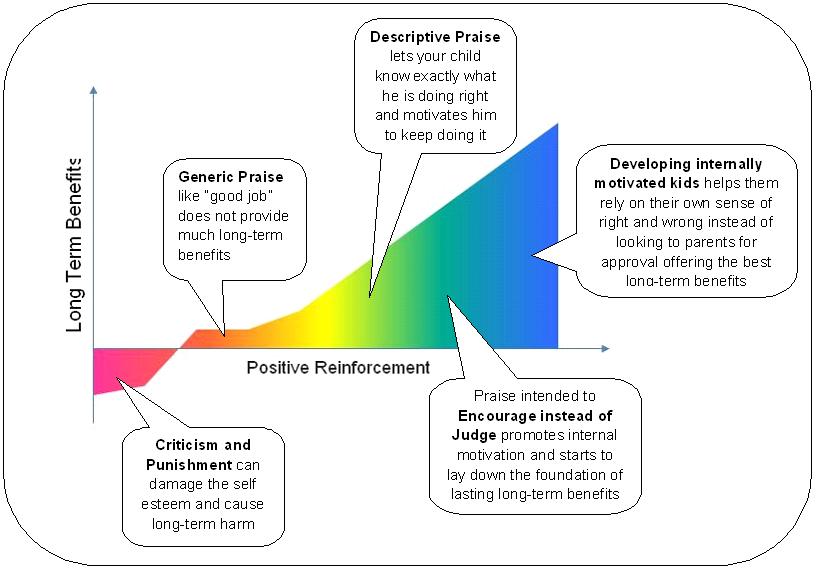I bet you’ve come across the term “positive reinforcement” before — but, honestly, do you know what it really means? Some time back, I decided to jump onto the positive reinforcement bandwagon. Except, it wasn’t really clear to me what it is I should be doing. The worst part? The more I read about it, the more confused I got.
This post originally appeared on A Fine Parent.
This article is the result of trying to sort through some of the confusion so we can be masters of applying positive reinforcement to raise terrific, internally motivated kids.
Use Praise/Reward Instead of Criticism/Punishment. Duh!

The first thing I understood is that I should use praise/reward instead of criticism/punishment. The argument is that criticising or punishing often kills a child’s spirit and self esteem. If you focus instead on praise, you reinforce the child’s self worth and since children inherently want to please their parents, this will make them want to behave instead of misbehave.
A couple of tips to handle situations that necessitate criticism/punishment:
Describe the Situation Instead of Fixing Blame
For example: Instead of screaming. “I told you to sit down while eating your dinner. Now, look what a mess you’ve made!”, try saying “If we don’t sit down when we eat, food falls everywhere and makes a mess.” Stop at that and get your child in the habit of cleaning his/her mess. Wait to catch at least one instance when the child eats without making a mess, and show your appreciation. Rinse, repeat, until things turn around.
Say Nothing
Children know when they’ve made a mistake. Instead of lecturing them, just take yourself out of the situation and let them work it out. Once they realise by themselves that they made a mistake and take ownership of it, they’re less likely to repeat it. This may sound simple, but from my own experience, this is one of the hardest tips to follow!
Express Your Feelings
Instead of lecturing, just express your feelings: “We need to leave now, otherwise mama will be late for work and get into trouble. And mama becomes sad if she gets into trouble.” Amazingly, this works a lot better than criticising my daughter as we try to get out the door in the mornings.
Put Things in Perspective and Let Things Slide
There, I said it! For someone who is a bit of a control freak, even saying this out loud is pretty painful. Most of the time, I can’t get myself to do this, but telling myself very often “She is just a five-year old,” does seem to help. Slowly I got in the habit of avoiding criticism and waiting to catch my daughter in the act of doing something good, and then showering her with praise. Except, as I looked more into it, I began to read:
1. Not all praise is created equal (i.e., there is a right way to praise and a not-so-effective way to praise).
2. While it may result in good short terms gains, excessive praise may have some negative long term consequences.
Yikes! Ohhhhhhhkay, moving on…
Praising the Right Way

When I started to focus on the right way to praise, here’s what I found out.
Make the Praise Descriptive Instead of Generic.
For example: Instead of a generic “good job!” say, “I like the way your shared the toy with your friend!” or “You did a good job cleaning up your toys today!” The equivalent of “good job” in adult terms is like saying “Let’s meet downtown,” whereas a descriptive praise is equivalent to saying, “Let’s meet at the intersection of 2nd Street and Colorado Street.”
The latter is a whole lot more helpful, right? The logic behind this is that kids inherently need our attention. By telling them exactly what it is that they did right, we empower them with the knowledge of exactly what to repeat to get our attention again.
Focus on the Effort Instead of the Outcome
When you have no clue what the masterpiece is that your toddler just handed you, instead of faking “That’s so beautiful!” say, “Wow, it looks like you put a lot of thought in it, what do we have here?” or, “Wow, you used so many colours to make this picture so beautiful!” The logic is, by focusing on the effort instead of outcome, we can avoid raising praise junkies whose sole intention is to finish the project to get praised by us (instead of taking pride in their own effort and what they have accomplished).
Focus on Encouragement Instead of Judgement
For example: Instead of “I like that you cleaned up your room!” which could send the signal that “mummy likes me only when I am being good, “say, “You cleaned up all the toys! The room looks so clean and beautiful! Thank you!” The idea here is to focus on “You did it!” and then highlight the consequences and express your happiness about it. No, you don’t have to break up all your responses in that way as long as the general message you send your children is that they did something right that resulted in good consequences. This helps the child develop a sense of internal evaluation, allowing them to take responsibility for their action and pride in their achievements.
Raising Internally Motivated Kids Instead of Externally Motivated Ones
So that leads us to the holy grail of positive reinforcement: cultivating internally motivated kids instead of externally motivated ones.
Frankly, I’m a long way off from getting to this point. I hope this month’s exercise in being positive, and specifically my focus on positive reinforcement, will help me get a little closer. I just want to put a few options on the table based on what I have read. Please note that this is not all from experience (yet!) and this is by no means a comprehensive list. (If you have a few additional tips, I would love to hear them — just drop a comment below!)
Acknowledge, but Do Not Explicitly Praise
It sounds so simple, yet, it’s very hard to let your child know that you agree what she did was right without resorting to platitudes like “Good job!” or even descriptive praise like “I love that you cleaned your room.” But, once a good parent-child bond is established, you can just stand by the door of the clean room and smile appreciatively or pat your child on the head to let them know that yes, you do agree with their internal assessment that what they did is right.
Ask Questions, Instead of Jumping in with Praise
While you work up to just a nod of the head, there are other options to let your child know that you’ve noticed without having to shower them with excessive praise. One of the suggestions by Dr. Alfie Kohn in the article Five Reasons to Stop Saying “Good Job!” is to just ask questions. In the example above, you could just describe what you see in the form of a question: “Did you do some magic in here? This place looks so clean and neat!” or, “Hey, it looks like put away all the toys back in their place! Did you figure out all by yourself what goes where?” and then let the kids describe with a beaming smile how they put away all the stuff and cleaned up the room.
Say Thank You
As pointed out by Dionna in the article 7 Alternatives to Telling Your Child “Good Job!“, many of the situations where we use “good job!” are situations that make our life easier. Why not come out and say it? In the example above, “Thank you for cleaning up your room. Now, that’s one less thing I have to worry about when the guests arrive!” will convey a heck of a lot more than “good job!”
No we have the whole positive reinforcement spectrum — and here’s a handy-dandy illustration of it:
For me, going from nagging/criticism to whatever it is I need to be doing to get her to want to sit down and enjoy a meal in peace has not been easy. As far as I am concerned, my goal is to stay out of pink/red and make progress towards the green/blue. Babysteps, remember?
Where on the positive reinforcement spectrum are you? (It’s normal to be all over the place, even within the course of a single day, as we react differently to different situations. Just think of one time period — ex. this morning from breakfast to lunch — and try to figure out what you did the most: punish, criticise, bribe, reward, praise, encourage, or work towards an increased level of internal motivation?) What is the one thing you need to stop doing when you interact with your kids to start moving towards the right of the spectrum?
How to Go From a Nagging Parent to a Master Motivator| A Fine Parent
Sumitha Bhandarkar is the creator of afineparent.com, a unique personal development blog exclusively for parents. If you’re a parent who believes that good parents are made, not born; if you believe that modelling how to live right is far more effective (and fun!) than lecturing; if you’re a do-er and not just a planner; click here to join Sumitha and a small group of like-minded parents.
Images via Peter Dalhgren/Flickr, altanaka, Oksana Kuzmina/Shutterstock.


Comments